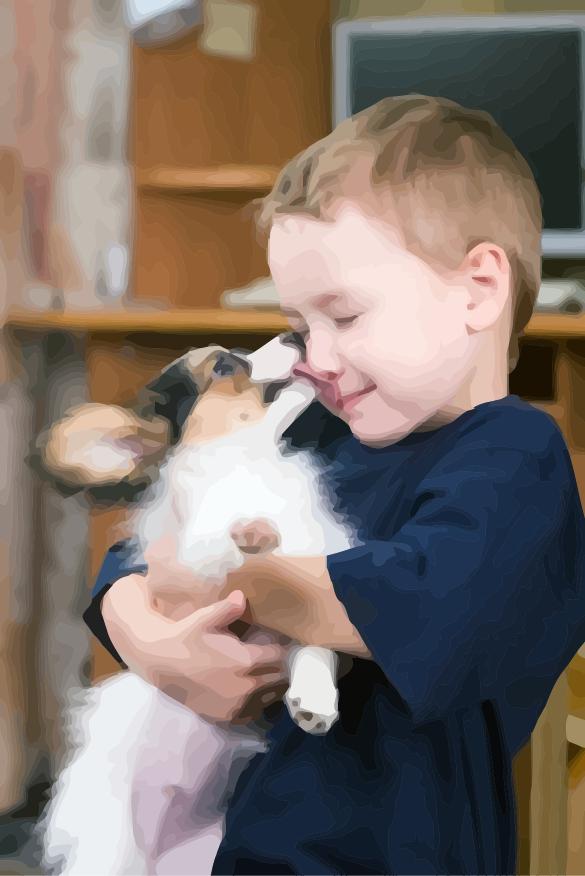Young Children and Dogs

A family dog can bring enormous pleasure, fun, and interest. Children learn responsibility by taking an active role in caring for a pet. The experience can help nurture their confidence and self-esteem, and they will benefit from a dog's ability to give unconditional, nonjudgmental love — a dog can make an excellent listener for childish woes and unhappiness.
However, the experience is not always a happy one. A child brought up with a badly trained or unfriendly dog may always have a fear and dislike of them. Equally, a single meeting with an unkind, thoughtless, or undisciplined child can make a dog suspicious of all children for life.
Before acquiring a puppy, discuss the decision thoroughly with the whole family. Find a breeder who is raising puppies in the home and avoid choosing a nervous, easily startled puppy. Don't adopt a dog or puppy from a rescue center unless you are completely satisfied that it is reliable with young children.
During its first few days at home, keep the children from fussing or crowding round the new arrival. Give it somewhere it can retreat on its own. Involve older children in feeding and caring for the puppy, but make sure a responsible adult is in charge. If children are given total responsibility for its care, they may inadvertently teach it bad habits such as chasing, jumping up, and nipping. A puppy in a busy family is at risk of growing up unruly because everyone is too occupied to pay enough attention to its education. On the other hand, a puppy raised with children will be well-socialized and used to all kinds of noises and unexpected events.
As your puppy starts to mature, you need to ensure they know about limits and boundaries, including places they are and are not allowed to go in your house, such as the baby's room. Set rules and stick to them; be consistent with everyone in the family. This will help your pet understand what is expected of them. You also want to ensure your dog is kept safe at all times, and a GPS dog collar can help ensure that you always know where they are. A collar like that can also be used to teach your dog boundaries and limits.
When Baby Arrives
When there's a dog already in the household, the arrival of a baby must be handled with extreme care and sensitivity. In the last weeks before the baby is due, cool your relationship with your dog. If it is used to sleeping in the bedroom, now is the time to break this habit—not after the baby is born. Ignore the dog more than usual and don't give it all its usual treats. It'll be tough going, but when the baby arrives, you should restore affection and privileges so that the dog comes to associate the baby's presence with its own improved status. If your dog is dominant, enlist the help of a behavior counselor early on in the pregnancy to bring about a better relationship. Sadly, in extreme circumstances you may have to find the dog an alternative home.
Never leave a dog on its own with the baby, even for a second. Minimize any feelings of jealousy or resentment by making a point of giving the dog a tidbit every time you feed the baby or change a diaper. Encourage visitors to make a fuss of the dog and play with it (not too close to the infant) when you are occupied with the baby. Hand the baby to someone else, and have a short game with the dog yourself.
Q&A
I'm expecting a baby shortly. I love the idea of pushing the baby in its stroller with a dog walking beside. Would you advise me to get a puppy?
No, because the demands of looking after a baby mean that you will be unlikely to have sufficient time to give to the education and care of a young puppy. A growing puppy may also prove boisterous around a small baby. I'd advise putting off having a puppy until your family has finished with the toddler stage.
We want to get a dog now, but haven't ruled out the idea of starting a family in two or three years time. What advice to you have?
Choose a breed that mixes well with small children, such as a Cavalier King Charles Spaniel, Shetland Sheepdog, or English Setter, and find a puppy that has been well socialized with children. A great deal depends on how it is brought up — you should work hard to establish a healthy and stable relationship with your puppy, ensuring that you are fully in control. Wait until the dog is at least 1 8 months old before starting your family.
839GYLCCC1992



Leave a Reply